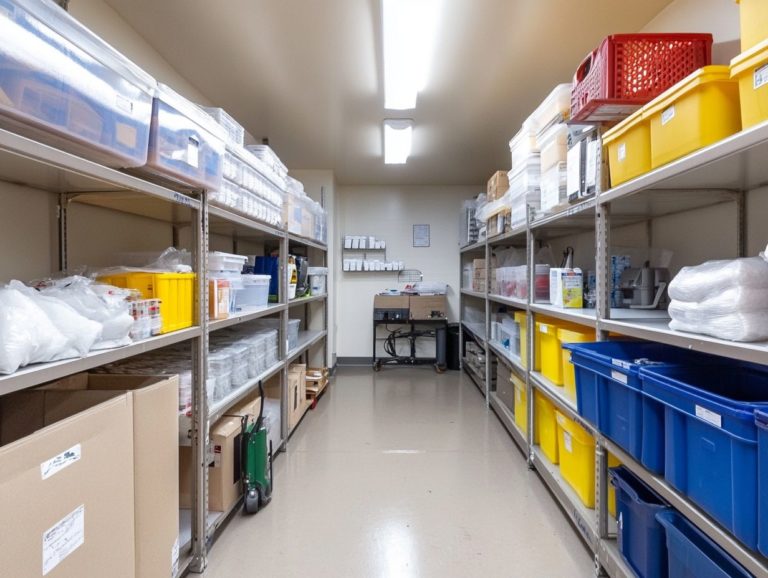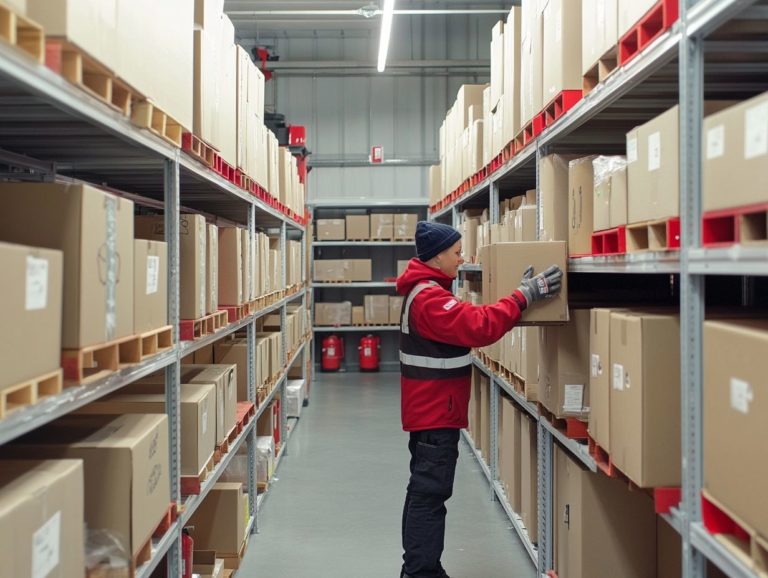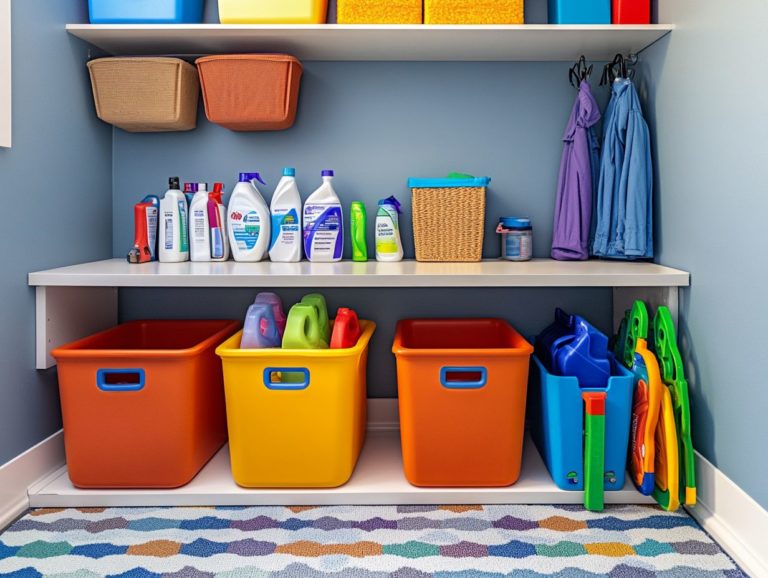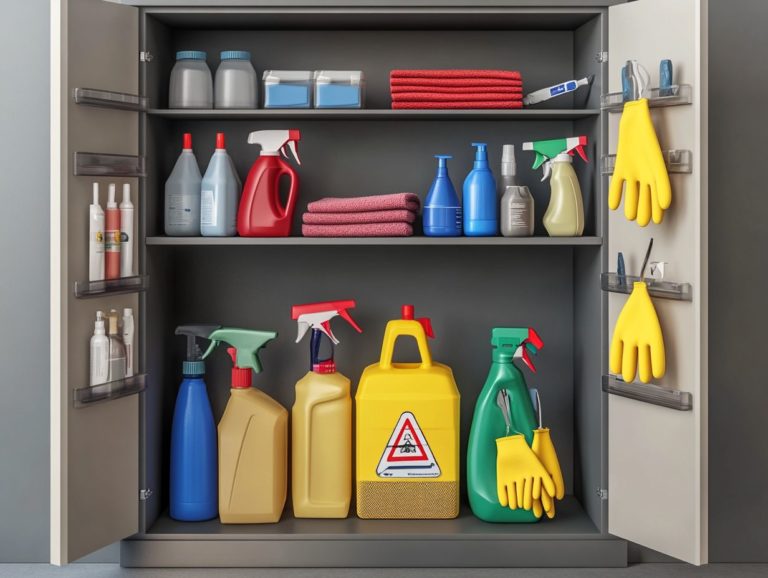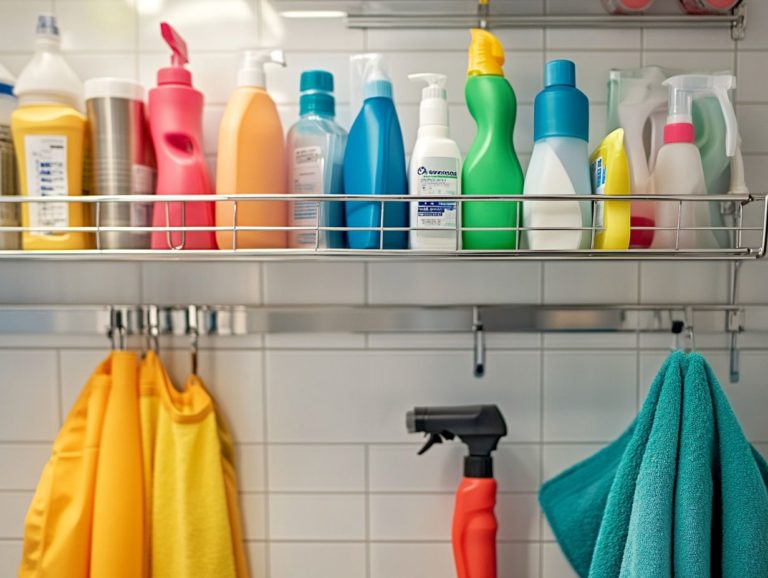How to Store Essential Oils Safely
Essential oils and natural oils are highly valued for their aromatic and therapeutic qualities. Understanding proper storage techniques is crucial to preserving their potency and extending their lifespan.
This article delves into the best practices for safely storing essential oils. We ll examine various factors that affect their shelf life and address the question of whether these oils can actually expire.
You ll also learn how to identify when oils have deteriorated and gather tips for keeping them fresh for as long as possible. Discover the joy of keeping your essential oils fresh and powerful!
Contents
- Key Takeaways:
- How to Store Essential Oils Safely
- What Is the Best Way to Store Essential Oils?
- What Are the Factors That Affect the Shelf Life of Essential Oils?
- Can Essential Oils Expire?
- What Happens When Essential Oils Expire?
- How to Properly Store Essential Oils?
- How Long Can Essential Oils Be Stored?
- What Are the Signs That Essential Oils Have Gone Bad?
- Frequently Asked Questions
- Why is it important to know how to store essential oils safely?
- What is the best way to store essential oils safely?
- Can I store essential oils in plastic containers?
- How should I label my essential oils for safe storage and use?
- Is it safe to store essential oils in the refrigerator or freezer?
- How long can I safely store essential oils and maintain their quality?
Key Takeaways:
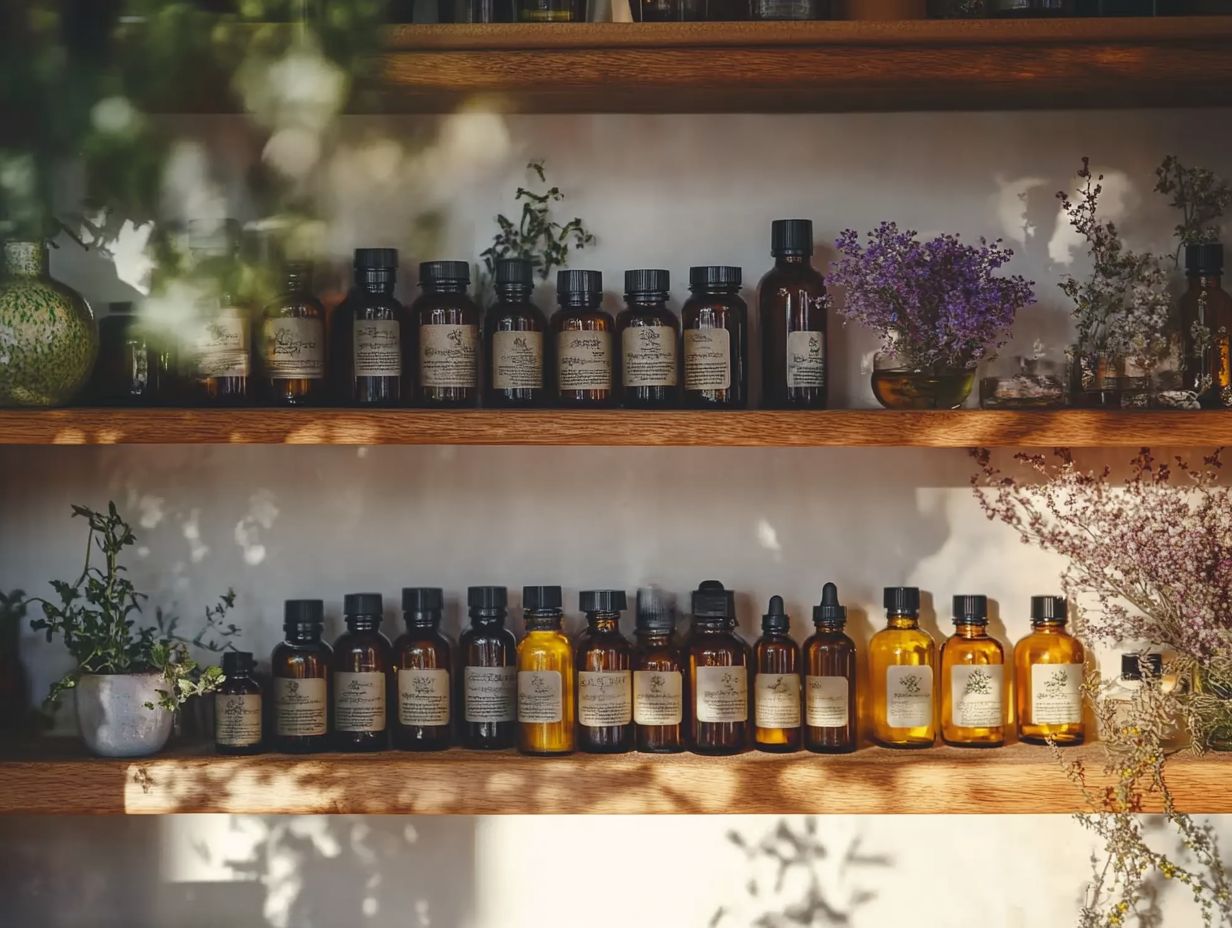
- Store essential oils in a cool, dark place away from direct sunlight and heat sources to prolong their shelf life and maintain their potency.
- The shelf life of essential oils can be affected by factors such as air exposure, temperature, and light exposure, so proper storage is crucial.
- Utilize proper storage conditions to maintain the efficacy and quality of your essential oils.
- Essential oils can expire, losing their therapeutic properties and potentially causing skin irritation or allergic reactions. Always check for expiration dates and signs of spoilage before use.
How to Store Essential Oils Safely
Proper storage of essential oils is paramount for preserving their therapeutic properties, aromatic qualities, and overall integrity. When these oils are stored improperly, they can deteriorate, resulting in reduced effectiveness and potential safety issues.
To fully harness the benefits of pure essential oils, it s vital to grasp the best storage practices. This includes understanding the ideal environments, container types, and conditions that safeguard against degradation.
Let s dive into essential tips that will help you store your oils like a pro! Whether you re using them for household cleaning with homemade cleaners, personal care, or embracing a natural lifestyle with natural products, this guide offers essential tips for storing essential oils safely.
What Is the Best Way to Store Essential Oils?
To ensure the longevity of your essential oils, the finest approach is to store them in dark glass bottles. These bottles effectively shield the oils from UV light, which can degrade their quality and diminish their therapeutic benefits over time.
In addition to using dark glass bottles, it s crucial to keep these precious liquids in a cool, dark environment, ideally between 60 F and 70 F. Excessive heat can adversely impact the integrity of the oils. For instance, citrus oils such as lemon and orange are particularly sensitive to both light and temperature fluctuations. Storing them away from direct sunlight can significantly extend their shelf life.
Choose amber or cobalt blue bottles for extra protection against environmental factors. Ensure that the bottles are tightly sealed after each use. This minimizes air exposure, which can lead to breaking down (or degradation) and a decline in the quality of your essential oils. Diluting oils with a carrier oil, such as jojoba oil or avocado oil, can also enhance their longevity and preserve their therapeutic properties.
What Are the Factors That Affect the Shelf Life of Essential Oils?
Several factors such as oxygen exposure, heat damage, and UV light affect the shelf life and integrity of essential oils, leading to oxidation and expiration. It is essential to be aware of these factors to ensure the preservation of your essential oils therapeutic properties and aromatic qualities.
When essential oils are exposed to oxygen, they undergo chemical transformations that can diminish their effectiveness, alter their aroma, and reduce their therapeutic benefits. Heat similarly poses a threat by breaking down delicate compounds and compromising the oils natural properties. UV light exacerbates this issue by triggering photochemical reactions that strip away the beneficial qualities of the oils.
To preserve the invaluable attributes of your essential oils, store them in dark glass containers and keep them in a cool, dry environment. This minimizes temperature fluctuations and light exposure. Don t risk your oils losing their potency take action now!
By implementing these practices, you can effectively extend the potency and fragrance of your essential oils, ensuring they remain effective for a longer time.
Start implementing these tips today and keep your essential oils vibrant and effective!
Can Essential Oils Expire?
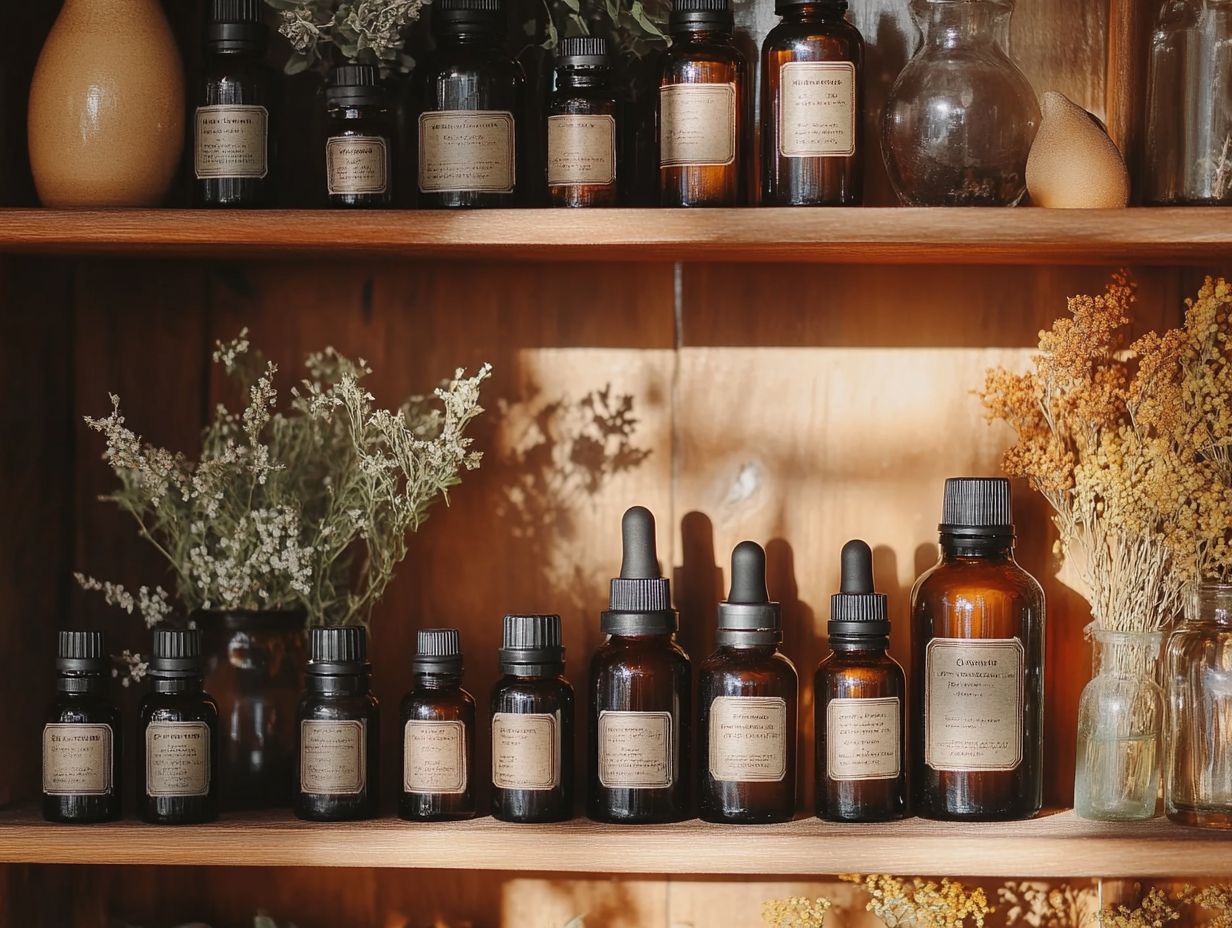
Yes, essential oils can expire. Over time, their quality may diminish, resulting in changes in aroma and efficacy.
Several factors can cause oils to expire. Exposure to light, heat, and air accelerates breakdown.
Look for signs of deterioration. These include changes in color, an off or rancid scent, or shifts in viscosity.
Being aware of these details helps your oils retain their beneficial properties. This knowledge enhances your safety and elevates your aromatherapy experience.
What Happens When Essential Oils Expire?
When essential oils reach their expiration date, they start to lose their aromatic properties and therapeutic benefits. They might even become a health hazard due to changes in their chemical composition.
Using these compromised oils can lead to skin irritations or allergic reactions, from mild redness to severe rashes. This is especially concerning if you have sensitive skin or pre-existing allergies, as the risks escalate with expired products.
It s essential for you to evaluate the safety of any essential oil before applying it to your skin or diffusing it into your environment.
Beyond just sidestepping irritation, it’s important for you to understand the shelf life of each oil. This knowledge ensures that you can still enjoy the intended health benefits, like an uplifted mood or improved respiratory function, without experiencing the unwanted side effects of deterioration.
How to Properly Store Essential Oils?
Wondering how to keep your essential oils fresh? Follow these best practices for optimal storage:
To properly store your essential oils, you should use airtight containers, keep them in a cool, dark place, and steer clear of heat and moisture. For more detailed guidelines, refer to our article on essential oil storage safety.
By following these guidelines, you can significantly extend the shelf life of your oils while preserving their aromatic and therapeutic qualities. It’s wise to choose dark glass containers; they protect the oils from light degradation, and ensuring the bottle is well-sealed is essential to prevent air from compromising their potency.
When organizing your collection, remember to keep the oils away from direct sunlight and in a location with stable temperatures. It’s crucial to avoid introducing moisture during storage; steering clear of humid places like the bathroom is a common oversight that can jeopardize the quality of your essential oils. For more detailed insights, check out how to safely store essential oils.
How Long Can Essential Oils Be Stored?
The shelf life of essential oils varies depending on the type, with some oils remaining effective for several years while others may lose their potency within just a few months.
Take lavender oil, for instance; it s renowned for its impressive longevity and can stay effective for up to five years. Eucalyptus oil and peppermint oil are other examples of long-lasting oils.
In contrast, citrus oils like lemon or orange tend to lose their vigor much more quickly, often within one to two years.
To ensure these precious oils last as long as possible, it s essential to store them in dark glass containers, away from direct sunlight and heat. Keeping the cap tightly sealed is also crucial, as it helps prevent oxidation.
If you frequently use essential oils, maintaining a consistent temperature during storage can truly enhance their quality and lifespan. This way, you can enjoy their full benefits for years to come!
What Are the Signs That Essential Oils Have Gone Bad?
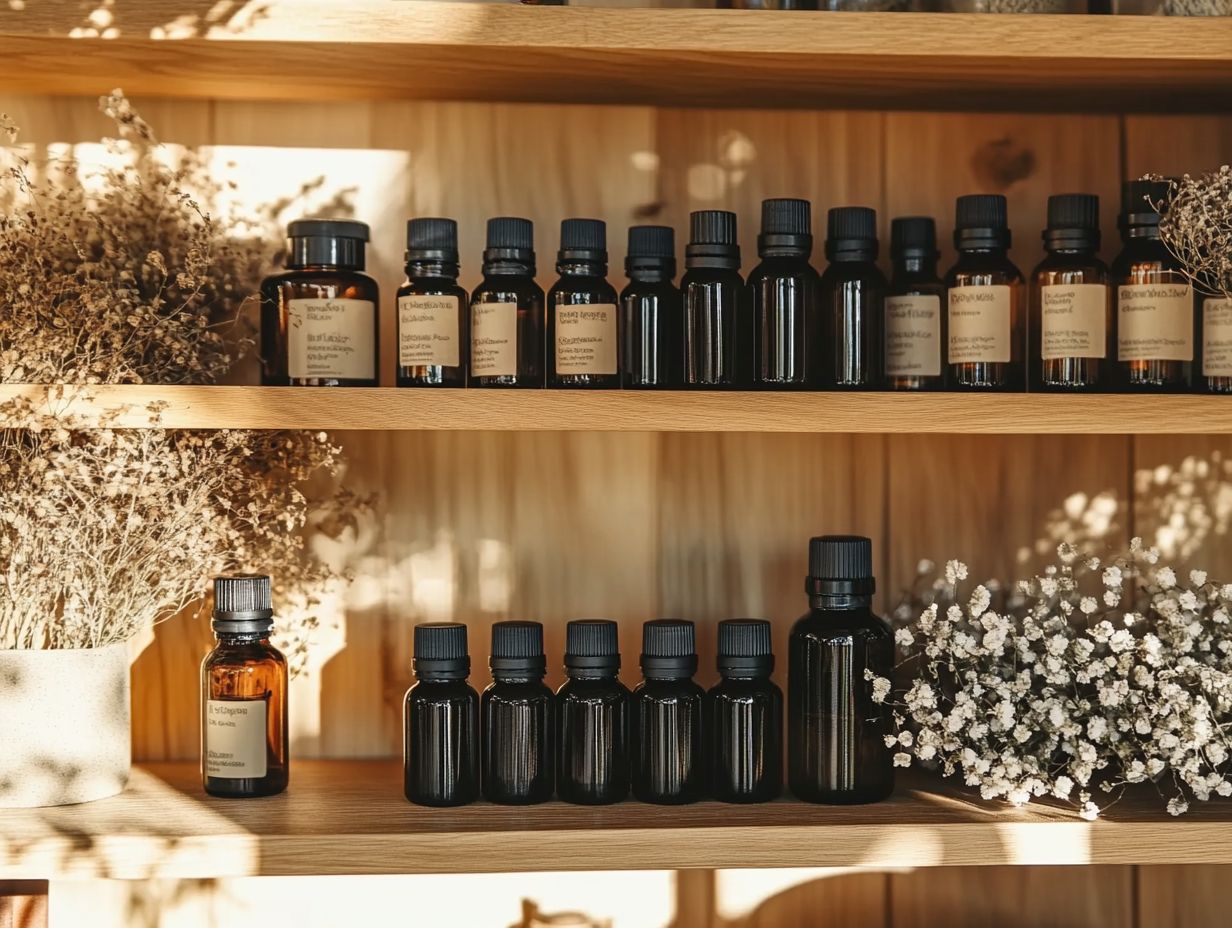
When essential oils go bad, you’ll notice changes in their scent, color, and thickness, signaling that their quality has diminished and they may no longer be safe to use.
If you catch a whiff of odors that remind you of bad smell or detect a musty scent, consider this a major red flag for spoilage. A thickened consistency can indicate oxidation, which undermines the freshness and effectiveness of the essential oil.
Being attentive to these specific indicators is vital. Using oils that have lost their original qualities could lead to skin irritations or diminish their therapeutic benefits.
Recognizing these signs helps you ensure the integrity of your essential oils. This ultimately safeguards your health and enhances your overall experience with these natural products. Essential oil consultation with experts like Robert Tisserand or Zora Degrandpre can provide additional guidance on maintaining essential oil quality.
Frequently Asked Questions
Why is it important to know how to store essential oils safely?
Essential oils are highly concentrated substances that can be flammable, corrosive, or toxic if not stored properly. Knowing how to store them safely can prevent accidents and preserve their potency and quality.
What is the best way to store essential oils safely?
The best way is to store them in a cool, dark place away from direct sunlight and heat sources. Avoid storing them in the bathroom or kitchen, as the humidity and heat can degrade the oils.
Can I store essential oils in plastic containers?
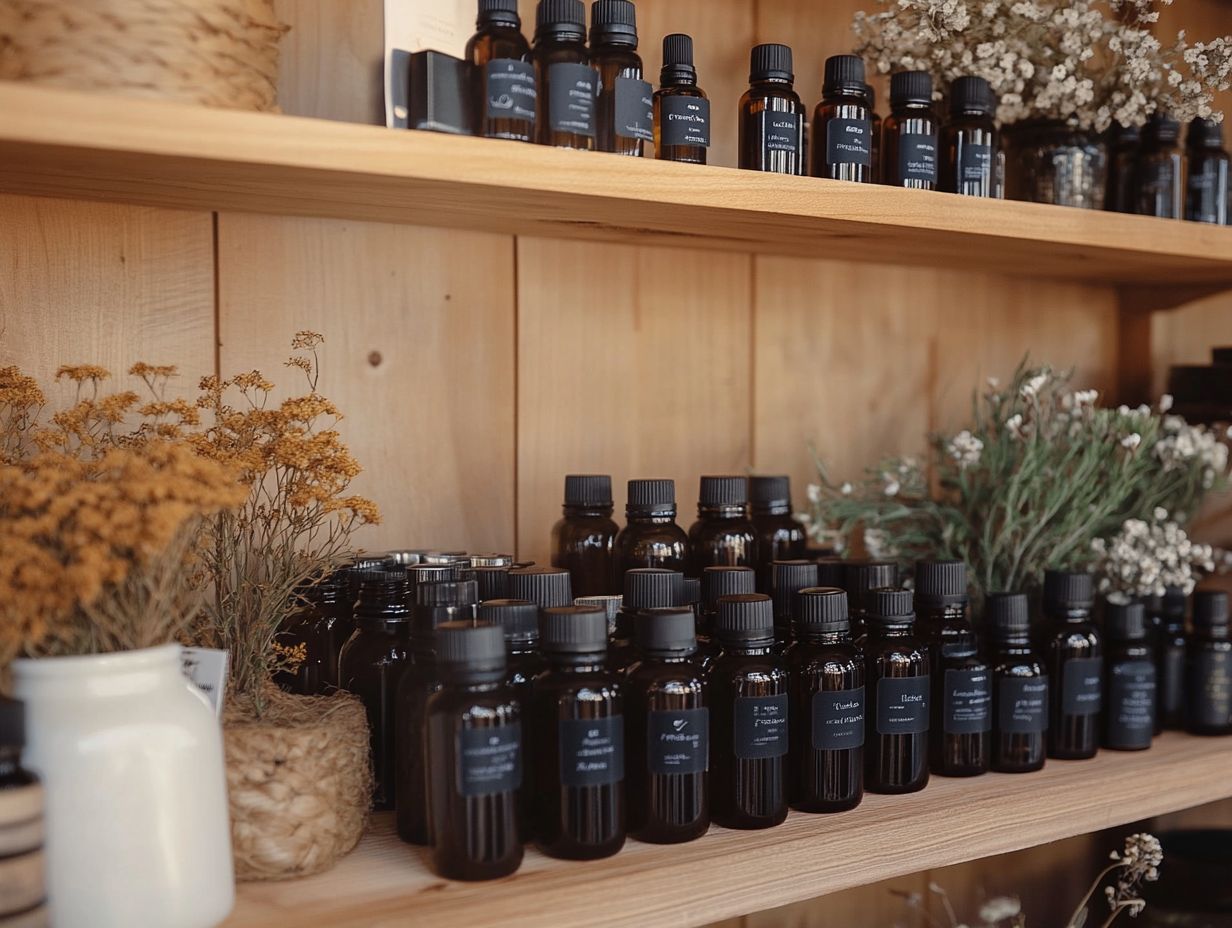
No, it is not recommended to store essential oils in plastic containers. The oils can interact with the plastic and potentially contaminate them. It is best to use glass or metal containers instead. Quality essential oil suppliers often use dark glass containers to ensure the best preservation of the oils.
How should I label my essential oils for safe storage and use?
Be sure to label your essential oils clearly! Include their name, date of purchase, and any safety precautions or dilution ratios. This will help you keep track of their shelf life and usage, and also ensure safe handling. Using dark glass or amber bottles can protect the natural oils from UV light and oxygen exposure, which are essential aspects of proper storage.
Is it safe to store essential oils in the refrigerator or freezer?
Some people choose to store their essential oils in the refrigerator, but this is not necessary. The fluctuating temperatures and moisture can actually cause the oils to degrade. It is best to store them in a consistent, cool environment away from heat damage. Following these storage tips will help in preserving oils and maintaining their aromatic properties and therapeutic benefits.
How long can I safely store essential oils and maintain their quality?
Act quickly most oils can last 1-3 years, but citrus oils only last 6-12 months! The shelf life of essential oils varies depending on the type of oil and its quality. Checking for signs of deterioration like changes in smell or color can help in monitoring oil oxidation and oil expiration.

